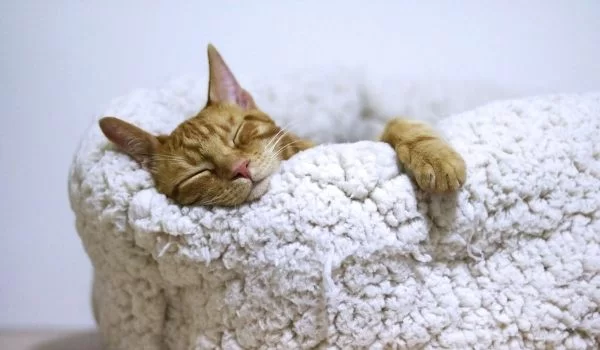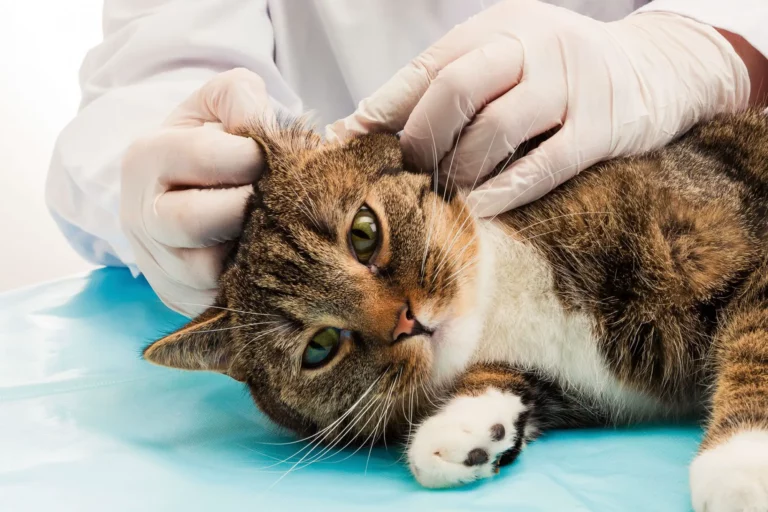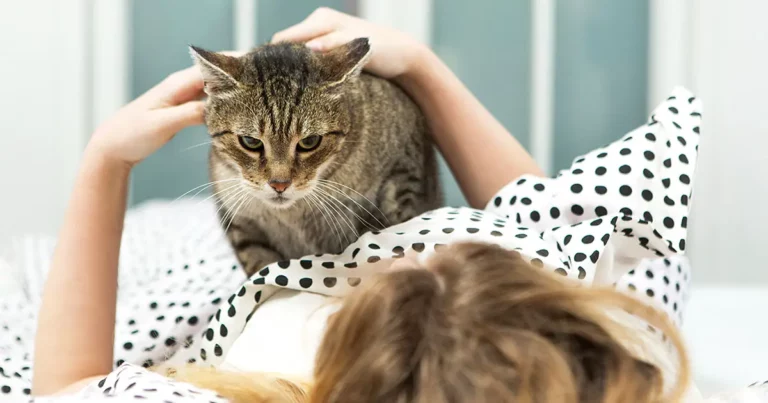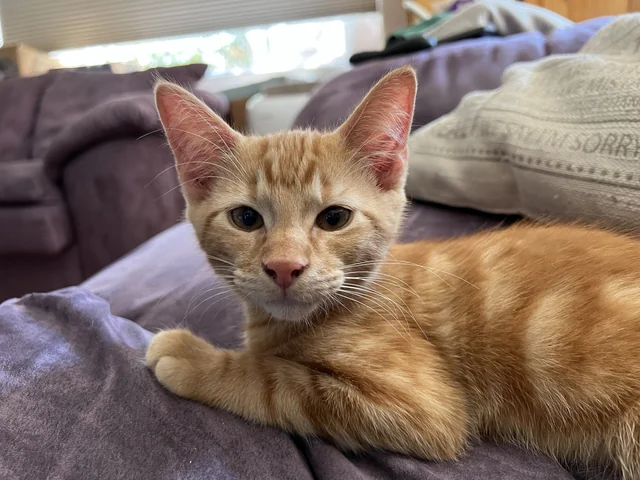Why Does My Cat Make a Groaning Noise When Sleeping?
Cats, just like humans, exhibit various behaviors and sounds while they sleep. Among these behaviors, some cat owners may notice their feline companions making groaning noises during their slumber. This can be concerning for pet owners, leaving them wondering if their cat is in distress or experiencing discomfort.
Understanding the reasons behind your cat’s groaning noises while sleeping is crucial for ensuring their well-being and overall health. By learning more about the potential causes of these sounds, you can take appropriate measures to address any underlying issues, thereby helping your cat enjoy a peaceful and restorative night’s sleep.
This article explores the common causes of groaning noises in sleeping cats, how to identify the underlying cause, and various solutions to help your cat sleep more peacefully.
Common Causes of Groaning Noises in Sleeping Cats
Dreams and REM sleep
Cats experience various sleep stages, including rapid eye movement (REM) sleep, during which they are more likely to dream. As a result, your cat’s groaning noises may simply be a reaction to their dreams. This is usually harmless and not a cause for concern.
Breathing issues
Breathing difficulties or obstructions can cause a cat to make groaning noises while sleeping. Common issues include nasal congestion, respiratory infections, or even more serious conditions such as asthma or heart-related problems. It is essential to observe your cat’s breathing patterns and consult a veterinarian if you suspect any breathing difficulties.
Gastrointestinal discomfort
Digestive issues can cause your cat to groan during sleep. Gas, bloating, or constipation can result in discomfort, leading your cat to make unusual noises while resting. Keep an eye on your cat’s eating habits and bowel movements to identify potential gastrointestinal issues.
Sleep position
Just like humans, cats may groan if they are in an uncomfortable or awkward sleeping position. In most cases, they will simply adjust their position and the groaning will cease. However, if you notice that your cat frequently groans due to their sleeping position, consider providing a more comfortable and supportive bed.
Aging and joint pain
As cats age, they may develop joint pain or arthritis, which can cause discomfort during sleep. This pain may lead your cat to make groaning noises while trying to find a comfortable position. If your senior cat is groaning more frequently during sleep, consult your veterinarian to discuss potential treatments or pain management options.
The Underlying Cause of Groaning Noise When Sleeping
Observing your cat’s sleep patterns
Keeping a close eye on your cat’s sleep patterns can help you identify the cause of their groaning noises. Observe the frequency, duration, and specific circumstances in which the groaning occurs. Note any changes in their sleeping environment or daily routine, as these factors may contribute to the noises.
Monitoring your cat’s overall health and behavior
In addition to observing your cat’s sleep, it’s important to monitor their overall health and behavior. Look for any changes in their appetite, weight, energy levels, and mobility. These changes could indicate an underlying health issue that may be contributing to the groaning noises during sleep.
Consulting your veterinarian for a thorough examination
If you’re unable to determine the cause of your cat’s groaning noises or if you suspect a serious health issue, it’s important to consult your veterinarian. They can conduct a thorough examination, including diagnostic tests, if necessary, to determine the underlying cause and recommend appropriate treatments or interventions.
Solutions and Remedies

Managing stress and anxiety in cats
If your cat’s groaning noises are a result of stress or anxiety, it’s important to identify and address the triggers. Create a calm and safe environment for your cat by providing them with a designated hiding spot and reducing loud noises or sudden movements. Engaging your cat in play and offering interactive toys can also help reduce stress and anxiety.
Improving your cat’s sleep environment
Ensure your cat has a comfortable and supportive bed that accommodates their size and preferred sleeping position. Place the bed in a quiet, warm, and draft-free area where your cat can relax undisturbed. Providing multiple sleeping options can also help your cat find the perfect spot for a peaceful night’s sleep.
Dietary modifications
If gastrointestinal discomfort is causing your cat’s groaning noises, consider making changes to their diet. Consult your veterinarian to determine the best dietary options for your cat, and consider incorporating a high-quality, easily digestible, and nutritionally balanced diet. You may also want to introduce probiotics or digestive enzymes to help alleviate gastrointestinal issues.
Physical therapy and joint supplements
For cats experiencing joint pain or arthritis, physical therapy and joint supplements can help alleviate discomfort and improve mobility. Consult your veterinarian to determine the most appropriate treatment plan, which may include massage, hydrotherapy, or laser therapy. Additionally, supplements containing glucosamine, chondroitin, and omega-3 fatty acids can help support joint health and reduce inflammation.
Treatment for respiratory conditions
If your cat’s groaning noises are due to respiratory issues, it’s important to address the underlying condition. Your veterinarian may prescribe medications or recommend other treatments to manage the symptoms and improve your cat’s breathing. In some cases, lifestyle changes such as weight management, reducing allergens in the environment, or using a humidifier may also be beneficial.
When to Seek Professional Help
Recognizing signs of a serious health issue
It’s essential to know when to seek professional help for your cat’s groaning noises during sleep. If the groaning is accompanied by other concerning symptoms, such as labored breathing, lethargy, loss of appetite, or difficulty moving, it’s crucial to consult your veterinarian immediately.
Importance of regular veterinary check-ups
Regular veterinary check-ups can help detect and address any health issues before they become more serious. Even if your cat’s groaning noises seem harmless, maintaining a routine check-up schedule allows your veterinarian to monitor your cat’s overall health and provide appropriate recommendations or interventions as needed.
Monitoring your cat’s condition after receiving treatment
If your cat has received treatment for an underlying issue causing their groaning noises, it’s important to closely monitor their condition. Keep track of any changes in their symptoms or behavior, and promptly report any concerns to your veterinarian. Ensuring your cat’s ongoing health and well-being is a crucial aspect of responsible pet ownership.
Tips for a Peaceful Night’s Sleep for Both You and Your Cat
Establishing a bedtime routine
Creating a consistent bedtime routine can help your cat settle into a more predictable sleep schedule. Engage in calming activities, such as gentle petting or brushing, to help your cat relax before bedtime. Keeping mealtimes and playtimes consistent can also help regulate your cat’s sleep patterns.
Providing comfortable and supportive bedding
Offer your cat a comfortable and supportive bed that suits their size, age, and sleeping preferences. Orthopaedic or memory foam beds can be especially beneficial for senior cats or those with joint pain. Ensuring your cat has a cozy and inviting sleep environment can help reduce groaning noises and promote more restful sleep.
Encouraging daytime activity and mental stimulation
A well-exercised and mentally stimulated cat is more likely to sleep soundly at night. Offer your cat plenty of opportunities for play and mental enrichment during the day to help burn off excess energy. Interactive toys, puzzle feeders, and environmental enrichment can all contribute to a more content and well-rested cat.
Limiting disruptions in the sleep environment
Minimize noise and light disruptions in your cat’s sleeping area, as these can disturb their rest and potentially cause groaning noises. Consider using blackout curtains or white noise machines to create a more peaceful sleep environment. Additionally, be mindful of your own movements and noises during the night, as they can inadvertently disturb your cat’s sleep.
Final Thoughts
Understanding the reasons behind your cat’s groaning noises while sleeping is essential for ensuring their overall well-being and health. By being aware of the potential causes and taking appropriate measures to address any underlying issues, you can help your cat enjoy a peaceful and restorative night’s sleep.
As a responsible cat owner, it’s crucial to be proactive in monitoring and addressing any changes in your cat’s health, behavior, and sleep patterns. Regular veterinary check-ups, creating a comfortable sleep environment, and providing appropriate care and support can all contribute to a healthier and happier cat. By being attentive to your cat’s needs and seeking professional help, when necessary, you can ensure a strong bond with your feline companion and promote their long-term well-being.
Frequently Asked Questions
Can a groaning cat still be in a deep sleep?
Yes, a cat can still be in a deep sleep while making groaning noises. These sounds may simply be a natural part of their sleep cycle, particularly during the REM stage when dreaming is most likely to occur.
How can I tell if my cat’s groaning is due to a dream or discomfort?
It can be challenging to differentiate between groaning due to dreams and groaning caused by discomfort. If the groaning is brief and not accompanied by other concerning symptoms, it’s likely related to dreaming. However, if the groaning is persistent or occurs alongside other signs of distress or pain, it’s important to consult your veterinarian to determine the cause.
Do certain cat breeds make more groaning noises while sleeping?
There isn’t conclusive evidence to suggest that specific cat breeds are more prone to making groaning noises while sleeping. However, certain breeds may have a higher risk of developing health issues that could contribute to groaning noises, such as respiratory problems in flat-faced breeds like Persians or joint issues in large breeds like Maine Coons.
Can my cat’s groaning noises during sleep be a sign of a neurological issue?
While it’s relatively rare, groaning noises during sleep could potentially indicate a neurological issue. If you have concerns about your cat’s neurological health, it’s important to consult your veterinarian for a thorough evaluation and appropriate diagnostic tests.
How can I help my cat if they are having nightmares?
If you believe your cat is experiencing nightmares, the best approach is to create a calming and secure environment for them. Ensure their sleeping area is quiet, warm, and free of disruptions. Additionally, providing your cat with plenty of affection and mental stimulation during their waking hours can help promote positive experiences and potentially reduce the occurrence of nightmares.


![How Do Cats Choose Who To Sleep With? [5 Factors]](https://www.warmlypet.com/wp-content/uploads/2023/03/why-cat-like-to-sleep-with-owners-768x432.webp)
![Why Does My Cat Keep Pooping Outside the Litter Box? [5 Things You Can Do]](https://www.warmlypet.com/wp-content/uploads/2023/01/senior_cat_not_using_litter_box-1024x548-1-768x411.webp)


